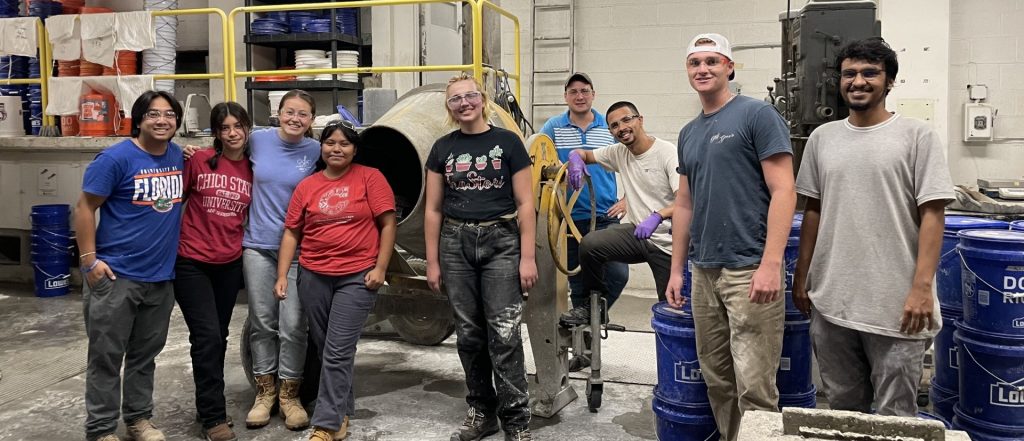
UF researchers have access to all of the equipment required to perform cutting edge research in state-of-the art facilities. UF Civil and Coastal Engineering department research laboratories for concrete durability are located in Weil Hall on the main UF campus. Additionally, the Powell Structures Laboratory is a multi-hazard research facilities dedicated to structural engineering, materials engineering, wind-engineering geotechnical engineering, pavements and non-destructive testing in support of research and education.
UF has standard equipment and facilities used to make and test concrete. The UF concrete mixing lab is AASHTO M 201 (ASTM C511) compliant and contains two concrete mixers with mixing capacities of 2 and 6 ft3, and an IMER Mortarman 750 mixer used to make ultra-high performance concrete. The lab also contains 5 qt. and 20 qt. mortar mixers. Standard mortar and concrete fresh property test equipment (scales, vibrating table, slump cones, air meters, thermometers, flow table, etc.) and aggregate property test equipment are available for use on this project. UF has a 440 ft2 ASTM C511 moist room with stainless steel shelving, as well as a 144 ft2 walk-in environmental chamber with range from -4°F to 140°F and 10 to 95% relative humidity to cure and store samples. Large aggregate drying ovens, a -40°F freezer, 1832°F muffle furnace, and three table-top environmental chambers are also available. A concrete saw, cylinder grinder and concrete compression machine with a 500 kip capacity are available for preparing and testing concrete cylinder capacity. UF also has an MTS university testing machine with hydraulic grips and alignment fixture for testing concrete flexure beams and direct tension specimens.
UF has specialty cement and concrete equipment relevant to this project in the Civil and Coastal Engineering department laboratories. UF has a thermogravimetric analyzer, eight-channel isothermal calorimeter, and semi-automated polishing wheel for scanning electron microscope sample preparation. UF has a Pheso concrete rheometer to measure concrete rheological properties. A pore press is available for use on this project to extract pore solution, as well as a pore solution resistivity cell to measure pore solution electrical properties. UF has a concrete resistivity meter, vacuum impregnation equipment, and has a Proove’it apparatus for measuring concrete rapid chloride permeability tests (RCPT) according to AASHTO T277/ ASTM C1202 and cells for rapid chloride migration testing (NT Build 492). The UF concrete permeability laboratory is located in Weil Hall and contains enough cells to test 60 concrete permeability samples simultaneously.
The Herbert Wertheim College of Engineering’s Research Service Centers (RSC) support and enhance the research, education, and public service missions of the University of Florida by providing access to characterization and process instrumentation (http://rsc.aux.eng.ufl.edu/). Expert staff provides the assistance and guidance necessary so that students, faculty, and industry get the most effective and appropriate use of the center’s facilities and is available to the research team for use for nominal fees. Equipment typically used for research involving concrete materials includes, mercury intrusion porosimeter (MIP), laser particle size analyzer, computed tomography (NANO-CT – GE V|TOME|X M 240), inductively couple plasma (ICP) for pore solution composition, scanning electron microscope, particle size and shape, BET, x-ray fluorescence, and Panalytical Xpert powder x-ray diffractometer are available to characterize cement and concrete materials.
Access to advanced additional analytical testing is available including but not limited to for imaging (various types of optical microscopes, profilometers, EPMA, TEM, AFM), compositional analysis (DSC/TGA/Mass Spectrometer, ICP-AES, FTIR, UV-VIS-NIR spectroscopy), surface sensitive techniques (XPS, AES, TOF-SIMS), nano-fabrication and testing (FIB, nanoindenter), sol-gel and particle analysis (SAXS, ELS), physical measurements electrical characterization (impedance spectroscopy), and a variety of sample preparation techniques. The Engineering School of Infrastructure and Environment has two facilities dedicated to structural and materials research. The Weil Hall and Powell Structures Laboratories are multi-hazard research facilities dedicated to structural engineering, materials engineering, wind-engineering geotechnical engineering, pavements and non-destructive testing in support of research and education.
The UF Libraries provide the research team with access to relevant reports and articles needed to complete the literature review. UF Libraries currently hold over 6 million print volumes, 1.5 million e-books, greater than 145,000 full-text electronic journals, and greater than 800 electronic databases. The libraries actively participate in demand-driven collection building so hundreds of thousands of book titles available in the library catalog and purchased when accessed. There are 7 libraries on campus; six of which comprise the George A. Smathers Libraries: Architecture & Fine Arts; Education; Health Science Center Libraries (UF campus & Borland in Jacksonville, FL); Library West (Humanities, Social Sciences, Business & Government Documents); Science (STEM); Smathers (Latin America, Special & Area Studies, Map & Imagery). The George A. Smathers Libraries collaborates closely with the Legal Information Center, which is part of the Levin College of Law. The transdisciplinary field of Civil Engineering requires use of resources at many campus libraries. The Library holds membership in the Association of Research Libraries, the Center for Research Libraries, Association of Southeastern Research Libraries, and other consortia ensuring convenient access to materials not held locally. A service known as “Uborrow” allows UF patrons to easily borrow materials from any other Florida state university or college library, in addition to traditional interlibrary loan services that borrows materials from libraries worldwide. UF librarian Michelle Leonard is available to assist the research team locate and acquire the standards, guides, and reference documents needed to complete the literature review in this project.